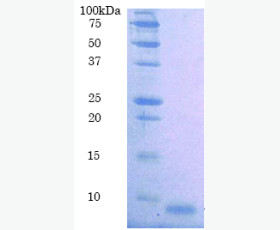Recombinant Human B-Cell Linker Protein/BLNK
| Product name: | Recombinant Human B-Cell Linker Protein/BLNK |
| Source: | E.coli |
| Purity: | Greater than 95% as determined by reducing SDS-PAGE. |
| Buffer Formulation: | Lyophilized from a 0.2 μm filtered solution of 20mM PB, 150mM NaCl, 1mM DTT, pH 7.2. |
| Applications: | Applications:SDS-PAGE; WB; ELISA; IP. |
| Storage: | Avoid repeated freeze/thaw cycles. Store at 2-8 oC for one month. Aliquot and store at -80 oC for 12 months. |
| UOM: | 100ug/50ug/200ug/1mg/1g |
| Source | E.coli |
| Description | Recombinant Human B-Cell Linker Protein is produced by our E.coli expression system and the target gene encoding Met1-Ser456 is expressed with a 6His tag at the C-terminus. |
| Names | B-Cell Linker Protein, B-Cell Adapter Containing a SH2 Domain Protein, B-Cell Adapter Containing a Src Homology 2 Domain Protein, Cytoplasmic Adapter Protein, Src Homology 2 Domain-Containing Leukocyte Protein of 65 kDa, SLP-65, BLNK, BASH, SLP65 |
| Accession # | Q8WV28 |
| Formulation | Lyophilized from a 0.2 μm filtered solution of 20mM PB, 150mM NaCl, 1mM DTT, pH 7.2. |
| Shipping |
The product is shipped at ambient temperature. |
| Reconstitution |
Always centrifuge tubes before opening. Do not mix by vortex or pipetting. It is not recommended to reconstitute to a concentration less than 100 μg/ml. Dissolve the lyophilized protein in ddH2O. Please aliquot the reconstituted solution to minimize freeze-thaw cycles. |
| Storage |
Lyophilized protein should be stored at < -20°C, though stable at room temperature for 3 weeks. Reconstituted protein solution can be stored at 4-7°C for 2-7 days. Aliquots of reconstituted samples are stable at < -20°C for 3 months. |
| Purity |
Greater than 95% as determined by reducing SDS-PAGE. |
| Endotoxin | Less than 0.1 ng/µg (1 IEU/µg) as determined by LAL test. |
| Amino Acid Sequence |
MDKLNKITVPASQKLRQLQKMVHDIKNNEGGIMNKIKKLKVKAPPSVPRRDYASESPADEEQQWS DDFDSDYENPDEHSDSEMYVMPAEENADDSYEPPPVEQETRPVHPALPFARGEYIDNRSSQRHSP PFSKTLPSKPSWPSEKARLTSTLPALTALQKPQVPPKPKGLLEDEADYVVPVEDNDENYIHPTES SSPPPEKAPMVNRSTKPNSSTPASPPGTASGRNSGAWETKSPPPAAPSPLPRAGKKPTTPLKTTP VASQQNASSVCEEKPIPAERHRGSSHRQEAVQSPVFPPAQKQIHQKPIPLPRFTEGGNPTVDGPL PSFSSNSTISEQEAGVLCKPWYAGACDRKSAEEALHRSNKDGSFLIRKSSGHDSKQPYTLVVFFN KRVYNIPVRFIEATKQYALGRKKNGEEYFGSVAEIIRNHQHSPLVLIDSQNNTKDSTRLKYAVKV SLEHHHHHH
|
| Background | B-Cell Linker Protein (BLNK) is a cell membrane protein which contains 1 SH2 domain. BLNK is expressed in B cells and fibroblast cell lines, playing a important role in B cell receptor signaling. BLNK as a central linker protein, downstream of the B-cell receptor (BCR), bridges the SYK kinase to a multitude of signaling pathways and regulating biological outcomes of B-cell function and development. BLNK associates with the activation of ERK/EPHB2, MAP kinase p38 and JNK, modulates AP1, NF-kappa-B and NFAT activation. BLNK involves in BCR-mediated PLCG1 and PLCG2 activation and Ca2+ mobilization and is required for trafficking of the BCR to late endosomes. BLNK deficiency results in agammaglobulinemia type 4 and much more profound block in B-cell development. |














